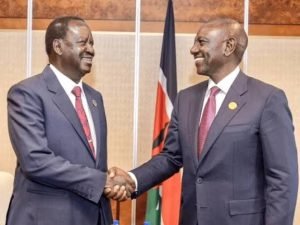
By Justin B.N Muturi
When Raila Odinga and ODM argue that “it is better to have a bad government than none at all,” they are not only wrong, they are dangerously wrong. The statement is meant to stoke fear, to lull citizens into accepting mediocrity and even grand corruption as the natural order of things.
It is a false choice, a manipulative framing designed to delegitimize any serious conversation about accountability, reform, and the rejection of rotten leadership.
History, both global and local, has already delivered a clear verdict: bad governments are not harmless placeholders. They are predatory machines. They loot, they kill, they repress, and they suffocate the possibility of a better future.
Saying that Kenya must accept a “bad government” is like telling a family whose house is on fire that they should not complain because at least they still have a roof even if that roof is about to collapse on them.
ODM’s argument hinges on the assumption that if citizens delegitimize a bad regime, then a power vacuum will emerge that is more dangerous than tolerating corruption. This is a myth. Nepal provides a counter-example worth recalling.
For years, Nepal experienced periods of having no effective government. What filled the void was not chaos but an awakening: ordinary citizens, civic movements, and alternative political forces reorganized themselves, forcing change and demanding a new social contract. Out of that turbulence, Nepal abolished its monarchy and drafted a new democratic constitution.
In other words, the absence of a government did not destroy the country. It created the political conditions for rebirth. The real danger was not in the vacuum but in the monarchy that had entrenched corruption and exclusion for decades. Similarly, in Kenya, the problem is not the fear of having no government but the tolerance of regimes that perpetually eat into our national soul.
Kenya’s constitution already guarantees continuity. ODM’s fear-mongering conveniently ignores the safeguards in our Constitution. Kenya is not a stateless society that collapses if one president or one regime is delegitimized.
Article 134 of the Constitution ensures continuity in executive functions. Parliament remains in place. County governments continue to function. The judiciary remains operational. Civil servants still run hospitals, schools, and essential services.
There is, in fact, no vacuum. The “bad government versus no government” narrative is a lazy excuse to normalize theft of public resources and abuse of power. What Raila Odinga is really telling Kenyans is: “You are lucky to have me and my political class even if we are thieves, because the alternative is worse.” That is absurd logic, an insult to the intelligence of the Kenyan people, and an abdication of leadership responsibility.
Let us be brutally honest. A bad government does not simply mismanage resources. It institutionalizes theft. It tells its cronies, “Go ahead, steal more, no one will stop you.” It emboldens cartels that siphon public money meant for hospitals, schools, and roads. It creates a culture of impunity where abductors and killers in state uniforms can silence dissent without consequence.
Every year that a bad government remains in office, Kenya loses billions of shillings that could have built industries, provided free education, or equipped hospitals. Every year of bad governance produces another cohort of hopeless, unemployed youth who see no path to dignity except migration or crime. Every year of bad governance entrenches inequality, forcing millions to live as second-class citizens in their own country.
How can anyone, least of all Raila Odinga, argue that this is better than no government? To endorse a bad regime is to bless continued looting, corruption, and killings. It is to say that fear and theft are acceptable foundations for national stability.
Raila’s statement is revealing. It shows the depth to which the political class has sunk. Instead of inspiring people to imagine better governance, ODM now seeks to manage expectations downward: don’t ask for honesty, don’t ask for competence, don’t demand accountability. Just be grateful there is someone seated in State House, even if that someone is robbing you blind.
This is fear politics. It is the same script despots everywhere use: accept us or risk chaos. But Kenya is not destined to choose between dictatorship and anarchy. We are a constitutional democracy with checks and balances. Our destiny lies not in tolerating thieves in office but in reclaiming our institutions and demanding integrity.
The real question is this: Why does ODM, a party that once symbolized the struggle for democracy, now preach resignation? Why is Raila Odinga telling Kenyans to lower their standards instead of raising them? Why does he see fear as the organizing principle of politics instead of courage, dignity, and justice?
Kenya does not need to choose between a bad government and no government. We must choose between bad government and good government. That choice is available. It only requires political will, civic courage, and the rejection of leaders who tell us to normalize corruption as the price of stability.
It is time to reject the dangerous lie that a bad government is better than none. The truth is that bad governments kill nations more surely than political vacuums ever could. Kenya’s Constitution ensures continuity of governance, even when leaders are removed or delegitimized.
What we can not afford is continuity of corruption, continuity of theft, and continuity of fear. ODM and Raila Odinga should stop selling fear and start selling hope. And if they cannot, then Kenyans must take it upon themselves to imagine, demand, and create a government that does not just exist for the sake of existence, but serves for the sake of justice, dignity, and progress.
The writer is a former Speaker of the National Assembly; Attorney General and the Cabinet Secretary for Public Service


